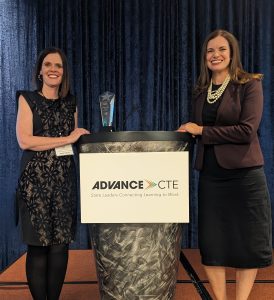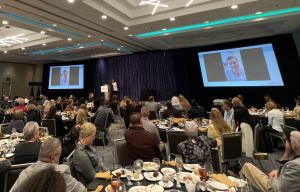This week lawmakers released a long-anticipated full-year funding proposal for the remainder of the federal budget, including for the U.S. Departments of Education (ED) and Labor (DOL). Elsewhere the Senate confirmed new DOL leadership overseeing the implementation of workforce development activities.
Lawmakers Propose Slight Increase in Perkins State Grant Funding
 As Advance CTE has shared previously, Congress has been delayed for nearly six months in finalizing and passing full-year funding for the current 2024 federal fiscal year (FY24), including for the U.S. Departments of Education (ED) and Labor (DOL), ahead of a March 22 deadline later today. Early yesterday morning, Congressional leaders unveiled the text of this long-awaited full-year FY24 funding package, also known as a minibus.
As Advance CTE has shared previously, Congress has been delayed for nearly six months in finalizing and passing full-year funding for the current 2024 federal fiscal year (FY24), including for the U.S. Departments of Education (ED) and Labor (DOL), ahead of a March 22 deadline later today. Early yesterday morning, Congressional leaders unveiled the text of this long-awaited full-year FY24 funding package, also known as a minibus.
Notably for the CTE community, the package proposes a $10 million increase for the Carl D. Perkins Career and Technical Education Act’s (Perkins V) basic state grant program––a key priority for Advance CTE throughout the FY24 process. The full-year FY24 funding package would provide $79.1 billion for ED’s budget and $13.7 billion for DOL’s budget, both of which are slightly below FY23 enacted levels. Due to tight budgetary constraints required by last year’s debt limit agreement, known as the Fiscal Responsibility Act, many education and workforce development programs are set to receive funding at roughly the same levels as FY23 or have slight reductions in funding support.
The FY24 package also includes a $20 million reduction in Perkins V’s national activities account––an area of the budget that ED has used previously to fund a newly created competitive grant program known as “Career Connected High Schools” (CCHS). Advance CTE and partners have previously shared concerns regarding this program and have called for greater resources to be dedicated to Perkins V’s state grant program to strengthen this foundational federal investment made in CTE. Beyond these aspects of the FY24 minibus, the funding package does provide significant new funding for childcare and early childhood education initiatives, as well as slight increases to Title I-A formula funding authorized by the Every Student Succeeds Act (ESSA).
Congress must work quickly today to vote on this FY24 funding package ahead of the aforementioned March 22 deadline at midnight this evening. Lawmakers in the House cleared the minibus by a 286-134 margin and it now goes on to the Senate for consideration and approval. Depending on how expeditiously Senators are able to take up this legislation today, a short lapse in appropriations still remains possible. Advance CTE is monitoring this process closely and will provide more information to the CTE community as these efforts move forward.
ETA Assistant Secretary Confirmed
Yesterday, March 21, the full Senate voted to confirm Jose Javier Rodriguez to lead DOL’s Employment and Training Administration (ETA) by a margin of 50-48. Rodriquez was first nominated by President Biden much earlier in the administration but his candidacy had been delayed in the Senate due to previous opposition from Senators Joe Manchin (D-WV) and Bob Menedez (D-NJ).  Yesterday’s confirmation vote marks the first time that ETA, DOL’s subagency which administers and oversees the Workforce Innovation and Opportunity Act (WIOA), will have a Senate-confirmed leader in this position during the Biden administration.
Yesterday’s confirmation vote marks the first time that ETA, DOL’s subagency which administers and oversees the Workforce Innovation and Opportunity Act (WIOA), will have a Senate-confirmed leader in this position during the Biden administration.
Steve Voytek, Policy Advisor


 This week both the House and Senate were in session ahead of a new funding deadline and the President’s annual State of the Union address to a joint session of Congress last night. The President’s address to Congress featured a range of topics, including how recent federal bipartisan legislation focused on infrastructure and the nation’s advanced manufacturing capacity have helped to spur greater demand for skilled workers. Notably, the President highlighted the importance of Career Technical Education (CTE) noting that his administration is working to connect “…businesses and high schools so students get hands-on experience and a path to a good-paying job whether or not they go to college.”
This week both the House and Senate were in session ahead of a new funding deadline and the President’s annual State of the Union address to a joint session of Congress last night. The President’s address to Congress featured a range of topics, including how recent federal bipartisan legislation focused on infrastructure and the nation’s advanced manufacturing capacity have helped to spur greater demand for skilled workers. Notably, the President highlighted the importance of Career Technical Education (CTE) noting that his administration is working to connect “…businesses and high schools so students get hands-on experience and a path to a good-paying job whether or not they go to college.” 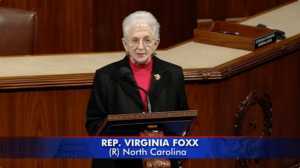
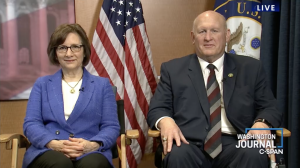
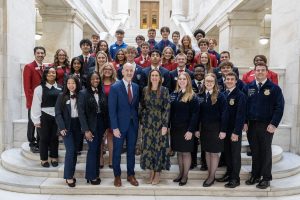
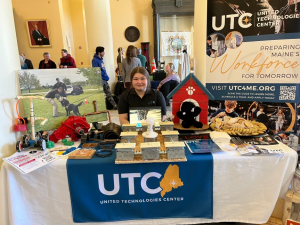 Maine kicked off Career and Technical Education (CTE) Month at the State House with a showcase featuring learners, instructors, and directors from 15 of the state’s 27 CTE centers. The showcase featured learners’ advanced skills in areas from biotechnology and hospitality to welding and graphic design. Notably, every instructor and director at the event reported an increase in “non-traditional students” participating in CTE programs.
Maine kicked off Career and Technical Education (CTE) Month at the State House with a showcase featuring learners, instructors, and directors from 15 of the state’s 27 CTE centers. The showcase featured learners’ advanced skills in areas from biotechnology and hospitality to welding and graphic design. Notably, every instructor and director at the event reported an increase in “non-traditional students” participating in CTE programs. 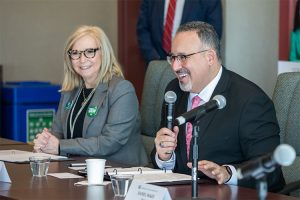 On February 21, U.S. Secretary of Education Miguel Cardona visited the Community College of Rhode Island (CCRI) as part of President Biden’s Investing in America Tour. The visit featured a tour of CCRI’s advanced manufacturing lab, a roundtable discussion with educational leaders, and dialogues with learners. Additional discussions took place with CCRI’s President Rosemary Costigan, Rhode Island Governor Dan McKee, and U.S. Representative Gabe Amo.
On February 21, U.S. Secretary of Education Miguel Cardona visited the Community College of Rhode Island (CCRI) as part of President Biden’s Investing in America Tour. The visit featured a tour of CCRI’s advanced manufacturing lab, a roundtable discussion with educational leaders, and dialogues with learners. Additional discussions took place with CCRI’s President Rosemary Costigan, Rhode Island Governor Dan McKee, and U.S. Representative Gabe Amo. 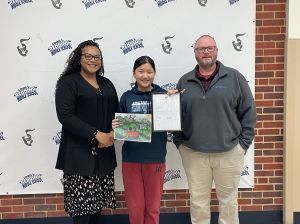 DACCTE Celebrates Poster Contest Winner
DACCTE Celebrates Poster Contest Winner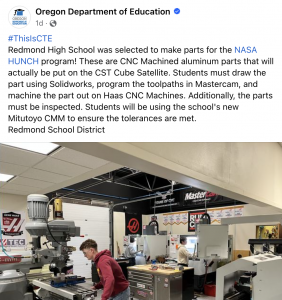
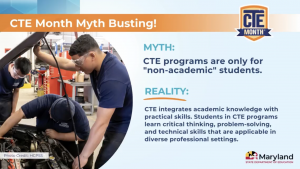
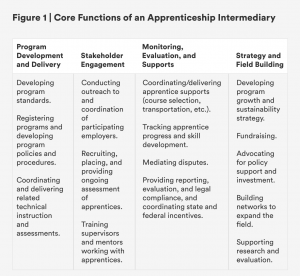
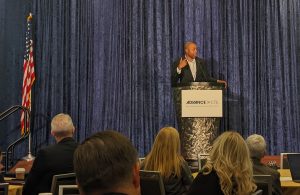 Our keynote speaker was Chike Aguh, an
Our keynote speaker was Chike Aguh, an 